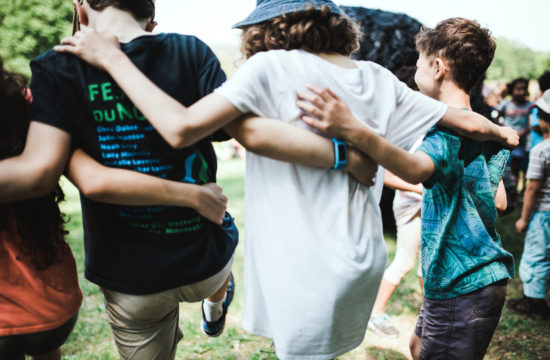FSMN students graduate with the essential qualities that create and support successful teams. These lifelong skills not only support success in today’s dynamic work environment, but also lead to more fulfillment in all areas of life.
In 2012, Google launched a project to figure out what made effective teams so effective. The project was called Project Aristotle, and its findings challenge common understanding about what makes a successful team.
The prevailing assumption is that the most effective teams are made up of the smartest or most creative people. Those who compete to be the best. The types of people who graduate at the top of their class.
That is not what Project Aristotle found.
Their research indicated that the highest performing teams create an environment of “psychological safety.” According to Harvard Business School professor Amy Edmondson, having “psychological safety” means a team is a safe places for interpersonal risk-taking. A study overview on reWork emphasizes this element, “Of the five key dynamics of effective teams that the researchers identified, psychological safety was by far the most important.”
Where does psychological safety come from? What kinds of people and behaviors support it?
Project Aristotle found the most successful teams were populated with people who listen to one another, have empathy, take the initiative to have hard conversations in resolving conflict, and know and care about each other as people–they see the whole person.
“The paradox, of course, is that Google’s intense data collection and number crunching have led it to the same conclusions that good managers have always known. In the best teams, members listen to one another and show sensitivity to feelings and needs.”
What Google Learned from Its Quest to Build the Perfect Team. New York Times Magazine.
Hmmm… This All Sounds Familiar
The results of this study are certainly interesting, but they won’t come as a big surprise to anyone who has spent time at FSMN. This is how we have always prepared our students. Yes, getting right answers and doing your best is important. Facing challenges and pushing yourself, individually, is one important way students learn and grow. However, equally important is asking the right questions and reflecting on your learning in a collective, community context. At FSMN, learning centers around seeing each other as unique, whole people. Our conflict resolution program is designed to help our students practice these concepts–knowing yourself and your peers well enough to know when something feels hurtful or upsetting, taking the initiative to have a hard conversation about it, really striving to listen to each other’s perspectives, and knowing that having these conversations will help you be better classmates.
A Life Well Lived is the Goal
In the end, does it matter that our graduates would be a perfect fit on corporate teams? No, it doesn’t. What matters is these skills will help our students wherever they choose to go and whatever they choose to do in life.
They are prepared to speak up for themselves, to see hurt and harm in the world, and they are equipped to disrupt injustice. These skills will not only help our students live fuller, richer lives, but will also radiate outward to influence the communities, teams and societies in which they live.
Use the FSMN Conflict Resolution Program at Home
Our conflict resolution program is designed to help build self-awareness, give participants a chance to practice listening and feeling empathy. It also helps us learn how to really see and hear each other so that we can repair relationships and deepen them. When we practice this process, we become better at working together and we get to know each other for the full, unique individuals that we are–we see the unique humanity in each other.
Conferences
What is a conference?
A conference is a specific process for dealing with conflict nonviolently. It takes place between two (or a few) people and a facilitator.
What is my role as an adult in the family?
Adults usually act as facilitators in a family conference, helping participants stay calm and guiding the conversation to a productive end using the rules and process described below. Children with a lot of conflict resolution experience may be able to fill the role of facilitator as well.
Who can call a conference?
Anyone in the family may call a conference with anyone else.
Conference Steps
1. Agree to the rules
- Listen and take turns speaking.
- Speak respectfully; no name calling or swearing.
- Try to solve the problem.
2. Clarify the issue
- Identify behaviors that contributed to the conflict.
- Share feelings.
- Listen and empathize with each other.
3. Make a plan
4. Closure
Tips for using conferences at home
- Physical environment: Be aware of times and places that are conducive to communication. The kitchen at dinnertime is probably not a good time or place for a conference. Some families have a “peace corner” or a special place they use for conferences. It helps if it is quiet and without visual distractions.
- A conference is not a replacement for discipline. Conferences are tools for listening and making plans for avoiding the issue in the future.
- Sometimes parents are concerned that the conference process may undermine their authority. If conferences are used as tools for making alternative behavior choices they actually support discipline at home by giving children responsibility and agency by incorporating their input into solutions to problems.
Group Gatherings
What is a group gathering?
Group gatherings (or family meetings) are meetings of the whole family to discuss issues that affect everybody. These could include such things as chores, allowances, where to have a family vacation. All members are free to bring up issues.
What is my role as an adult in the family?
Your role has three parts: to guide the group gathering by using the process described below, to help everyone follow the same rules as used in conferences, and to participate in the discussion. Children with a lot of experience having group gatherings at school may be able to facilitate as well.
Group Gathering Steps
- Begin with a few moments of silence.
- Ask if there are any issues.
- Clarify the issue you will work on.
- Make a plan – Brainstorm possible solutions and choose a practical and fair solution.
- Provide closure.
Tips for using group gatherings at home
- This process works best when families set aside a short period of time weekly, biweekly, or monthly to hold a group gathering or family meeting.
- Some families keep a notebook in which families write down issues for discussion. A piece of paper on the fridge works well. The family decides which issues need the most attention at their meeting.
- Brainstorming is a great way to include everyone. It is important to treat all ideas as valid when generating a list. Later, discuss whether the plan is workable and fair to eliminate outrageous suggestions without getting anyone involved in a power struggle.


